Fiction
The below fiction books were chosen for their focus on the Holocaust. They are listed in alphabetical order and give an youth's view to what it was like during and after the Holocaust.
After the War by Carol Matas
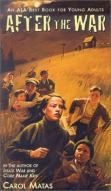
Publisher: Simon, September 1, 1997
Format: Book
Age: Grade 7 - 10
Summary: After being released from Buchenwald at the end of World War II, fifteen-year-old Ruth risks her life to lead a group of children across Europe to Palestine. -- From Publisher
Review: Matas's historical novel shows that the persecution of Europe's Jewish population did not end with their liberation from the Nazi death camps. She tells the story of Ruth, 15, who makes her way back from Buchenwald to her Polish homeland to discover that Jews are still viewed by others with suspicion and hatred. Desperate and alone, she meets Saul, who persuades her to join a group of refugees planning to emigrate to Palestine. Historically, the book is accurate and references to actual events are interwoven neatly into the narrative. The author does oversimplify the position of the British and their decision to stop Jewish immigration to Palestine, and this is a definite weakness. Nonetheless, the story is strong and compelling and the use of descriptive language creates a mood of desperation and hope combined with a commitment to survival. The use of flashbacks is effective and serves to sustain the mood as well as add depth to Ruth's character. After the War is a thought-provoking novel that offers great insight into the current problems in the Middle East and the passion with which the Jewish people will fight to protect what they perceive to be rightfully theirs.-- Robyn Nicoline Ryan, School Library Journal
The Book Thief by Markus Zusak
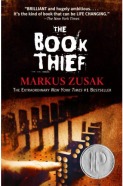
Publisher: Knopf Books, March 14, 2006
Format: Book
Age: Grade 9 & up
Summary: Set during World War II in Germany, Markus Zusak’s groundbreaking new novel is the story of Liesel Meminger, a foster girl living outside of Munich. Liesel scratches out a meager existence for herself by stealing when she encounters something she can’t resist–books. With the help of her accordion-playing foster father, she learns to read and shares her stolen books with her neighbors during bombing raids as well as with the Jewish man hidden in her basement before he is marched to Dachau. -- From Amazon.com
Review: Death is the narrator of this lengthy, powerful story of a town in Nazi Germany. He is a kindly, caring Death, overwhelmed by the souls he has to collect from people in the gas chambers, from soldiers on the battlefields, and from civilians killed in bombings. Death focuses on a young orphan, Liesl; her loving foster parents; the Jewish fugitive they are hiding; and a wild but gentle teen neighbor, Rudy, who defies the Hitler Youth and convinces Liesl to steal for fun. After Liesl learns to read, she steals books from everywhere. When she reads a book in the bomb shelter, even a Nazi woman is enthralled. ...the astonishing characters, drawn without sentimentality, will grab readers. More than the overt message about the power of words, it's Liesl's confrontation with horrifying cruelty and her discovery of kindness in unexpected places that tell the heartbreaking truth. --Hazel Rocham, Booklist
The Boy in the Striped Pajamas by John Boyne
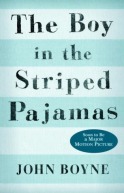
Publisher: David Fickling Books; Reprint edition October 23, 2007
Format: Book
Age: Grade 9 & up
Summary: Berlin 1942, When Bruno returns home from school one day, he discovers that his belongings are being packed in crates. His father has received a promotion and the family must move from their home to a new house far far away, where there is no one to play with and nothing to do. A tall fence running alongside stretches as far as the eye can see and cuts him off from the strange people he can see in the distance. But Bruno longs to be an explorer and decides that there must be more to this desolate new place than meets the eye. While exploring his new environment, he meets another boy whose life and circumstances are very different to his own, and their meeting results in a friendship that has devastating consequences.--From Publisher
Review: Some of the most thought-provoking Holocaust books are about bystanders, including those who say they did not know what was happening. This first novel tells the bystander story from the viewpoint of an innocent child. Bruno is nine when his family moves from their luxurious Berlin home to the country, where "the Fury" has appointed Bruno's father commandant. Lost and lonely, the child hates the upheaval, while his stern but kind father celebrates his success because he has learned to follow orders. Bruno can see a concentration camp in the distance, but he has no idea what is going on, even when he eventually meets and makes friends with Shmuel, a boy from Cracow, who lives on the other side of the camp fence. The boys meet every day. They even discover that they have the same birthday. It's all part of a poignant construct: Shmuel is Bruno's alternative self, and as the story builds to a horrifying climax, the innocent's experience brings home the unimaginable horror.-- Hazel Rochman, Booklist
Escaping into the Night by D. Dina Friedman
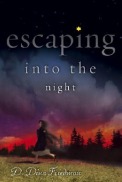
Publisher: Simon & Schuster, January 24, 2006
Format: Book
Age: Grade 7 -10
Summary: Halina Rudowski is on the run. When the Polish ghetto where she lives is evacuated, she narrowly escapes, but her mother is not as lucky. Along with her friend Batya, Halina makes her way to a secret encampment in the woods where Jews survive by living underground. As the group struggles for food, handles infighting, and attempts to protect themselves from the advancing Germans, Halina must face the reality of life without her mother.-- From Publisher
Review: Loosely based on actual events, this dramatic story of escape from the Warsaw Ghetto offers insight into the will to survive. After her mother is killed by the Nazis and the ghetto is evacuated, Halina Rudowski escapes through an underground tunnel to the forest with the help of her mothers boyfriend. Though she has resented Georg in the past, she eventually realizes that he cares for her as a father would. She hides with a group of Jews living in underground bunkers. Strengthened by the knowledge that her mother would have wanted her to survive, the 13-year-old turns from her despair and perseveres despite unbearable obstacles. Halina is embarrassed into bravery by the courage of her friend Batya as the two girls join a group trying to find food for the encampment. Later she risks her life to save Batya. She develops a crush on a boy who is working for the resistance. In Halina, Friedman has created a reluctant heroine who is also a believable adolescent. Readers will be pulled into this story that combines adventure, mystery, and the resilience of human nature... -- Renee Steinberg, School Library Journal
If I should Die Before I Wake by Han Nolan
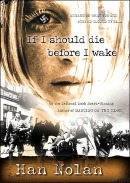
Publisher: Harcourt, May 1, 2003
Format: Book
Age: Grade 7 - 12
Summary: Hilary hates Jews. As part of a neo-Nazi gang in her town, she's finally found a sense of belonging. But when she's critically injured in an accident, everything changes. Somehow, in her mind, she has become Chana, a Jewish girl fighting for her own life in the ghettos and concentration camps of World War II. -- From Publisher
Review: High-school student Hilary Burke, whose rebellion against her fundamentalist Christian mother takes the form of hanging out with local neo-Nazis, lies unconscious in an intensive-care ward after a motorcycle accident. The other patient in the unit is an aged Holocaust survivor, Chana Bergman. Before returning to consciousness, Hilary slips into Chana's memory and travels back in time to the Lodz ghetto and Auschwitz. Chana's chapters dominate the text until the elderly woman dies and Hilary returns to life, no longer anti-Semitic. This first novel has great strengths and weaknesses. The time travel is contrived, the characterization of Hilary's mother is shallow and unbelievable, a hospital fire set by neo-Nazis is an unnecessary plot element, and the preachy message about the "new" Hilary changing the world is tabloid psychodrama. Chana's story, however, is brilliantly rendered. Without sensationalizing or blurring, Nolan evokes the physical and emotional crowding of shared living space, the desperate struggle for food each day, and the compromises required for survival. Despite the contrived machinery through which it's introduced, Chana's story carries memorable emotional impact. -- Mary Harris Veeder, Booklist
The Man from the Other Side by Uri Orley
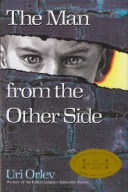
Publisher: Houghton Mifflin, April 29, 1991
Format: Book
Age: Grade 9 & up
Summary: The true story of a teenager's experiences in the Warsaw Ghetto during World War II, as he discovers his own heritage and finds himself caught up in the war through underground dealings.-- From Publisher
Review: Based on a true story of a Polish boy living in Nazi-occupied Warsaw just before the 1943 uprising, this understated but very revealing fictional memoir follows 14-year-old Marek through some harrowing experiences as he is drawn into this Jewish battle for survival--on both sides of the Ghetto wall. Until his Catholic mother informs Marek that his father was a Jew and had been killed in prison because he was a Communist, the boy has extremely negative feelings about Jews. When he helps Jozek, a Polish Jew hiding from the Nazis and anti-Semitic Poles in Warsaw, he begins a series of events that ultimately results in Jozek's violent death at the hands of the Nazis and Marek's narrow escape from the beseiged quarter. Characterizations are vivid and finely drawn, even those of minor figures such as Marek's empathetic mother who is embarrassed by her countrymen's hatred of Jews; his crude, contradictory stepfather; and his grandparents, who treat Jozek as a family member, all the while hating Jews. This is a story of individual bravery and national shame that highlights just how hopeless was the fate of the Warsaw Jews as they fought alone and heroically against the Nazi war machine. --Jack Forman, School Library Journal
Nightfather by Carl Friedman
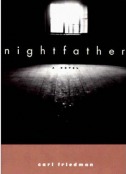
Publisher: Persea Books, October 1, 1995
Format: Book
Age: Approx. Grade 8 and up
Summary: Nightfather is a novel about the Holocaust like no other. ...the young daughter of a survivor tells of the efforts she and her two brothers make to try to bridge the gulf between themselves and their father that has been formed by his camp experiences. Unlike many of his generation, who remain silent, their father feels compelled to repeat the details of his ordeal. The children inhabit two worlds at once: the world of school and their friends, and their father's nightmare world of hunger, gas, and the crematoria. Every ordinary incident - a trip to the zoo, a drive in the country, an invitation to join Brownies - evokes a memory and a story of the camp. What are children to make of stories of humiliation and murder? Where do the stories stop and reality begin? Striving to find a balance, the children consider their father's world in terms of their own. They have had chicken pox and measles; he has "camp." Toothpaste is not only for brushing teeth, but also for emergency use to prevent thirst. As their father prowls restlessly through the house at night, telling them more and more about the camp, the children's essential innocence remains strangely intact, making its horrors at once easier to face and all the more harrowing. Gradually, with accumulating force, the story of one man's imprisonment and the terms of his survival are revealed. -- From Publisher
Review: Dutch poet and journalist Friedman's first novel is a harrowing and deeply moving account of three siblings' struggle to understand their father, a Holocaust survivor plagued by nightmares and horrific memories. "I've had camp," Ephraim explains, referring to his ordeal as if it were the flu or measles, hoping to make it more comprehensible to his sullen preteen son, Max, to the younger and more innocent Simon and to his unnamed eight-year-old daughter, who narrates the story in a terse, precocious, lyrical voice. Eventually, Ephraim relives his camp experience with adult candor, telling his offspring of gassings, slave labor, torture and sadistic beatings, of how he murdered a camp boss and of his miraculous liberation and reunion with Bette, his wife and the children's mother. Friedman, whose father was a Holocaust survivor, manages despite all odds to tell her story with a light touch, showing keen insight into the emotional confusion and moral growth that the siblings undergo as they strive to fathom absolute evil and how it has scarred their father. -- Publishers Weekly
